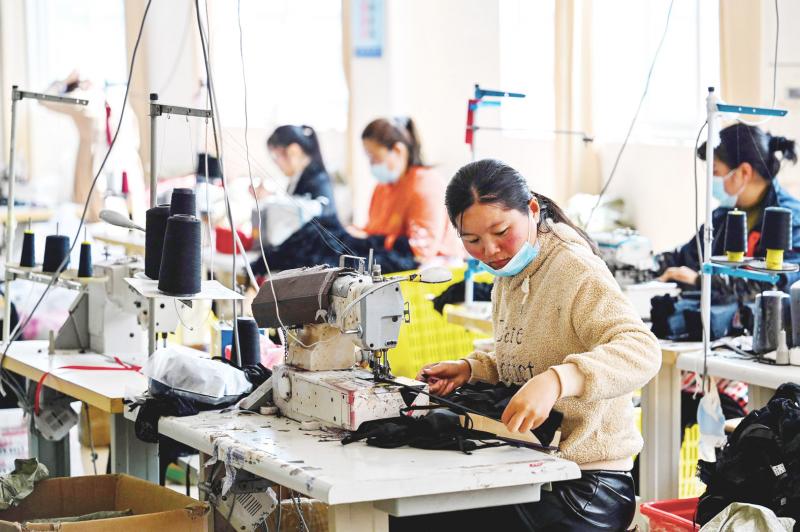Americans like their lingerie to be risque, Europeans prefer it classier, and Chinese remain a bit shy, but are opening up — but the biggest order of all came from North Korea.
So goes the street-corner discussion in Guanyun, a coastal county that for generations followed the rhythms of wheat and rice cultivation, but today concerns itself with global lingerie preferences.
The flat farming region between Beijing and Shanghai is China’s self-proclaimed “Lingerie Capital,” where sewing machines hum in village micro-factories to meet up to 70 percent of the fast-growing domestic demand.

Photo: AFP
Millions more items are exported annually in a textbook example of the ability of Internet-enabled Chinese entrepreneurs to profit from even the most off-the-wall idea.
The man widely credited with lighting the spark is Lei Congrui, a lanky 30-year-old with a ponytail and cap who would look at home on a skateboard. It all happened almost by accident.
As a teenager 15 years ago, Lei began making extra cash by hawking various consumer goods on the country’s growing e-commerce sites.

Photo: AFP
“Customers kept asking if we have any lingerie. I had never heard of it before, but I just said: ‘Yes,’ and then looked up what it was,” he said.
Lei “figured out a way” and now employs more than 100 workers who push lacy black and red panties, and bustiers through stitching machines.
His brands, such as “Midnight Charm,” pull in more than US$1.5 million in annual revenue, he said.
The success of early movers such as Lei inspired an industrial revolution.
The Guanyun Provincial Government said that there are more than 500 factories employing tens of thousands, and churning out more than US$300 million of lingerie annually.
Loosening Chinese sexual attitudes made it all possible.
Communism left a prevailing legacy of modesty. Pornography is banned and authorities launch periodic crackdowns on anything deemed “vulgar.”
However, prolonged exposure to more open foreign attitudes is liberating a younger generation, especially women.
Market consultancy iiMedia said that Chinese online sales of sex-related products grew 50 percent in 2019 to US$7 billion. It predicted 35 percent growth last year, despite fallout from the COVID-19 pandemic.
“Attitudes of the young are catching up and bringing sensuality into the home. [Lingerie] is becoming popular,” said Li Yue, a local lingerie factory worker.
When Lei first started, most buyers were more than 30, and many had lived abroad or had some other exposure to foreign ways.
However, by about 2013, volumes jumped as a younger generation of Chinese consumers began discovering their sensuality, Lei said, adding that most buyers are now aged 22 to 25.
Initially, loose-fitting, not-too-revealing designs were favored in China, but today, semi-transparent, “body-hugging” numbers dominate.
Guanyun’s industrial reinvention did not happen overnight. Early pioneers found it difficult to hire squeamish local staff.
“When they first came in contact with these things, they didn’t quite understand,” said Chang Kailin, 58, who runs a factory and is Lei’s uncle. “But after the industry got bigger and stronger, people could make money and shake off poverty. Now everyone loves it.”
Lei exports 90 percent of his output, mostly to the US and Europe. Significant volumes also go to South America, where sales indicate role-playing costumes rule the bedroom.
Middle Eastern buyers — favoring longer, more modest items — are also surprisingly active, as are Africans, who like a splash of color. Southeast Asia is growing fast as well.
However, Lei’s biggest single order — worth US$1 million — came from a mysterious North Korean buyer in 2012, but the customer abruptly backed out without explanation and the merchandise was sold elsewhere.
Lingerie has transformed Guanyun, with factories sprouting up next to wheat fields, and newfound wealth displayed in new homes and vehicles.
Previously, many of the county’s about 1 million inhabitants left for the hard life of a migrant worker in far-off factories.
No more, said Li, the garment worker.
“Working away from home, you get homesick,” the mother of two said. “These companies allow us to come home to work. It’s not easy out there.”
Guanyun has broken ground on a US$500 million, 690-hectare lingerie-themed industrial zone that is to “integrate research and development and design, fabric accessories, e-commerce operations, warehousing and logistics.”
Pandemic lockdowns last year hit output. It has since roared back, but demand remains tepid in overseas markets still struggling with COVID-19, while home-bound consumers are concentrating spending on basic household necessities, Lei said.
“After these problems are solved,” he said, smiling. “They will be ready to play again.”

NO EXCUSES: Marcos said his administration was acting on voters’ demands, but an academic said the move was emotionally motivated after a poor midterm showing Philippine President Ferdinand Marcos Jr yesterday sought the resignation of all his Cabinet secretaries, in a move seen as an attempt to reset the political agenda and assert his authority over the second half of his single six-year term. The order came after the president’s allies failed to win a majority of Senate seats contested in the 12 polls on Monday last week, leaving Marcos facing a divided political and legislative landscape that could thwart his attempts to have an ally succeed him in 2028. “He’s talking to the people, trying to salvage whatever political capital he has left. I think it’s

Polish presidential candidates offered different visions of Poland and its relations with Ukraine in a televised debate ahead of next week’s run-off, which remains on a knife-edge. During a head-to-head debate lasting two hours, centrist Warsaw Mayor Rafal Trzaskowski, from Polish Prime Minister Donald Tusk’s governing pro-European coalition, faced the Eurosceptic historian Karol Nawrocki, backed by the right-wing populist Law and Justice party (PiS). The two candidates, who qualified for the second round after coming in the top two places in the first vote on Sunday last week, clashed over Poland’s relations with Ukraine, EU policy and the track records of their

UNSCHEDULED VISIT: ‘It’s a very bulky new neighbor, but it will soon go away,’ said Johan Helberg of the 135m container ship that run aground near his house A man in Norway awoke early on Thursday to discover a huge container ship had run aground a stone’s throw from his fjord-side house — and he had slept through the commotion. For an as-yet unknown reason, the 135m NCL Salten sailed up onto shore just meters from Johan Helberg’s house in a fjord near Trondheim in central Norway. Helberg only discovered the unexpected visitor when a panicked neighbor who had rung his doorbell repeatedly to no avail gave up and called him on the phone. “The doorbell rang at a time of day when I don’t like to open,” Helberg told television

‘A THREAT’: Guyanese President Irfan Ali called on Venezuela to follow international court rulings over the region, whose border Guyana says was ratified back in 1899 Misael Zapara said he would vote in Venezuela’s first elections yesterday for the territory of Essequibo, despite living more than 100km away from the oil-rich Guyana-administered region. Both countries lay claim to Essequibo, which makes up two-thirds of Guyana’s territory and is home to 125,000 of its 800,000 citizens. Guyana has administered the region for decades. The centuries-old dispute has intensified since ExxonMobil discovered massive offshore oil deposits a decade ago, giving Guyana the largest crude oil reserves per capita in the world. Venezuela would elect a governor, eight National Assembly deputies and regional councilors in a newly created constituency for the 160,000